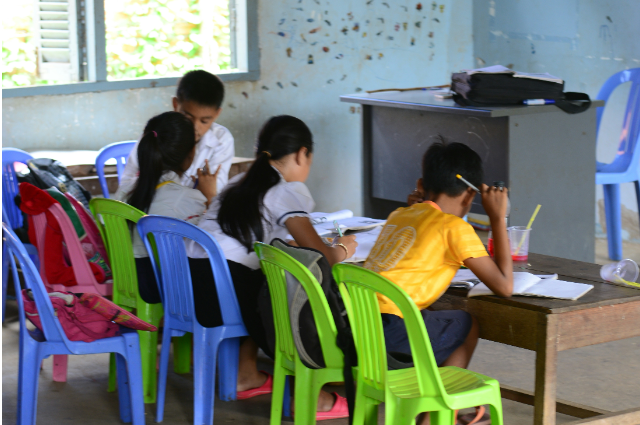
Photo by Odd Fellow on Unsplash
Introduction:
In the ever-evolving landscape of education, a critical question arises: Should students be required to learn and memorize information readily available on the internet, showcasing their ability to regurgitate facts, or should the emphasis shift towards fostering creativity? This debate lies at the heart of educational philosophy, challenging traditional notions of rote memorization and standardized testing. In this article, we explore the merits of both approaches and advocate for a balanced education that encourages students to not only absorb information but also think critically and creatively.
The Changing Face of Education:
Gone are the days when access to information was limited to textbooks and encyclopedias. The internet has democratized knowledge, placing a wealth of information at our fingertips. While this accessibility is undoubtedly a boon, it begs the question: Should students be burdened with memorizing facts that can be easily looked up? Proponents of this viewpoint argue that memorization builds a foundational understanding and ensures a common knowledge base. However, critics contend that this approach stifles creativity and fails to prepare students for the dynamic challenges of the real world.
Memorization vs. Creativity:
The traditional education system often prioritizes memorization as a measure of intelligence. Standardized tests assess a student's ability to recall information, leading to a system that rewards memorization over critical thinking. Memorization undoubtedly has its merits – it can enhance a student's retention and recall abilities. However, it falls short in nurturing the essential skills required in today's fast-paced and unpredictable world.
On the other hand, fostering creativity involves encouraging students to think outside the box, solve problems innovatively, and apply knowledge in novel ways. Creativity is not about memorizing a set of facts but about understanding concepts deeply and using that understanding to generate new ideas. Advocates for creativity argue that it is a vital skill for success in the 21st century, where adaptability and innovation are prized.
Balancing Act:
Rather than pitting memorization against creativity, the ideal educational approach lies in striking a balance. Memorization can serve as a foundation, providing students with a basic understanding of subjects. However, it should not be the sole focus. Education should evolve to emphasize critical thinking, problem-solving, and creativity.
Encouraging students to question, analyze, and synthesize information allows them to develop a deeper understanding of the subject matter. Moreover, fostering creativity equips students with the skills needed for success in a world where automation and artificial intelligence are reshaping industries.
Real-World Application:
One of the criticisms against a solely memorization-based approach is its limited real-world application. In professional settings, success is often determined by one's ability to apply knowledge creatively, solve complex problems, and adapt to changing circumstances. A balanced education that integrates memorization with critical thinking prepares students for the challenges they will face beyond the classroom.
The Role of Technology:
Technology, particularly the internet, plays a pivotal role in this educational paradigm shift. Rather than viewing the internet as a threat to traditional education, it should be embraced as a powerful tool for learning. Educators can leverage technology to facilitate access to information while focusing on developing skills that go beyond mere memorization.
Project-Based Learning:
An effective way to foster creativity is through project-based learning. This approach encourages students to work on real-world projects, applying their knowledge in practical scenarios. Project-based learning not only enhances creativity but also hones teamwork, communication, and problem-solving skills – essential attributes in any professional setting.
The Importance of Soft Skills:
In addition to creativity, the emphasis on soft skills becomes crucial in a balanced educational approach. Skills such as communication, collaboration, adaptability, and emotional intelligence are increasingly valued in the workplace. Integrating opportunities for students to develop these skills alongside traditional academic learning creates a well-rounded education.
Championing Individualized Learning:
Every student is unique, with different strengths, weaknesses, and interests. A one-size-fits-all approach to education may not cater to the diverse needs of learners. Individualized learning plans that allow students to explore their passions, strengths, and areas of interest can contribute to a more engaging and effective educational experience.
Preparing for an Uncertain Future:
As the world continues to change at a rapid pace, the ability to adapt and innovate becomes paramount. A balanced education that combines memorization with creativity prepares students not only for current challenges but also for the uncertainties of the future. The goal is to cultivate lifelong learners who are equipped with the skills necessary to navigate an ever-evolving landscape.
Government Exams and the Challenge of Creativity:
In the context of education, an area where the balance between memorization and creativity is often scrutinized is in government examinations. Take, for instance, the renowned UPSC (Union Public Service Commission) exams. These exams, crucial for selecting candidates for various civil services in India, have long been criticized for their emphasis on recalling historical facts and established knowledge. The questions posed in these exams often require candidates to regurgitate information from the past rather than demonstrate innovative thinking or problem-solving abilities.
This raises a pertinent question about the extent to which these examinations truly evaluate a candidate's capacity to adapt to contemporary challenges or contribute creatively to public service. The prevailing trend leans heavily towards assessing the retention of established facts, potentially sidelining the development of critical thinking skills that are increasingly essential in today's complex world.
Conclusion:
In the ongoing debate between memorization and creativity, the answer lies in finding a harmonious balance. Education should not be a binary choice but a dynamic synthesis of traditional knowledge acquisition and creative thinking. By embracing technology, incorporating project-based learning, and championing individualized approaches, educators can create a system that prepares students for the challenges and opportunities of the 21st century. In doing so, we pave the way for a generation of learners who are not only knowledgeable but also creative, adaptable, and ready to shape the future.
